
By Richard Eaton
Photos by Steve Line/SquashPics.com
When you are the first person from your country ever to receive its highest recognition for arts, sports, science or humanity, you probably feel as though you are not entitled to lose the World Open.
That is the degree of status which Nicol David has gained in Malaysia, and this was the level of pressure with which she had to deal as she won back the world title.
It was David’s second major atonement in six months and one that establishes her as by far the finest player of modern times, as the highest profile woman player there has ever been, and as nearer to joining the pantheon all time greats—though purely in squash terms there remain doubts about that.
First David made up for last year’s British Open loss by winning the title back in Liverpool in May; now she regained the World Open, fighting off feelings of shirked responsibility to which it is so easy to succumb when just about every person in your country requires you to succeed.
“I feel relief that I actually did it,” David’s words issued quietly after a surprisingly hard-fought final in which she labored to win 5-11, 11-1, 11-6, 11-9 over a Vicky Botwright playing the best squash of her career in her last professional match.
The local lass, who had to return to work at her brand-new full-time job as the venue’s head coach at 9 a.m. the following morning, inevitably stole much of the spectators’ attention, but in terms of the significance for one of the globe’s largest and fastest developing regions there has probably never been a win quite as significant as David’s.
“I feel all sorts of things,” she said, when pushed to continue. “There are all mixed emotions because this world title is clearly a different feeling, coming after losing it. But emotionally I am still quite stunned. I am not sure what I feel.”
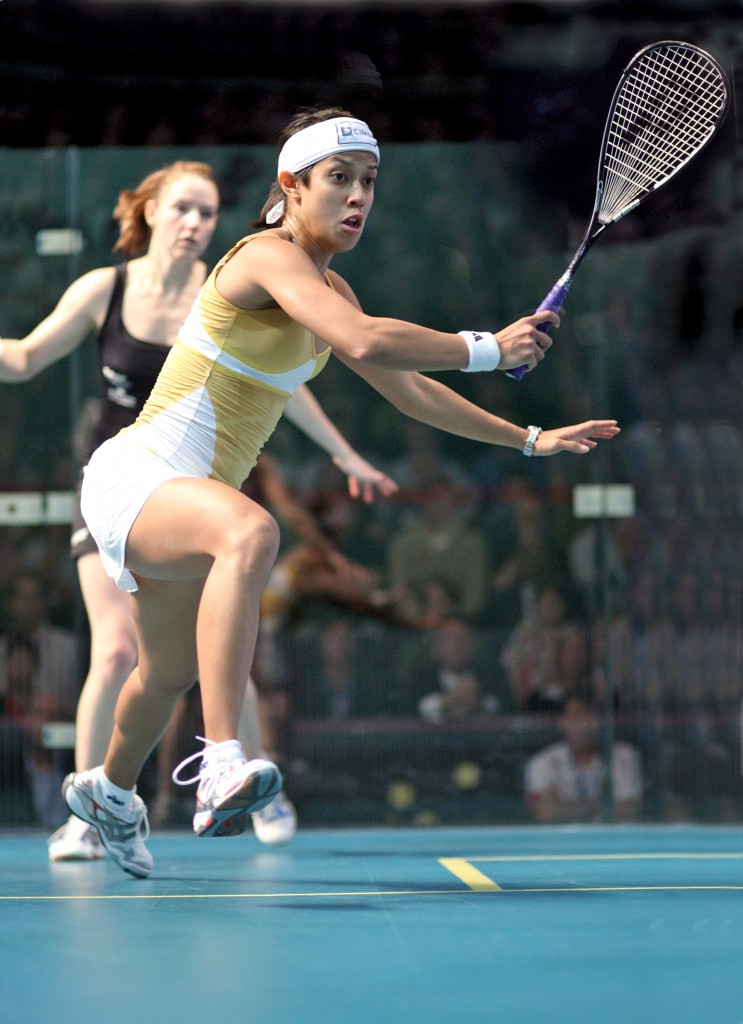
Well she had it right the first time. It was quite evident that it was relief. The expression suggesting that a boulder might be about to land on her head had been replaced by something which looked more like the rising sun.
Consider what she had to live up to. The Order of Merit was conferred upon her by none other than Yang di-Pertuan Agong Tuanku Mizan Zainal Abidin—the king, basically—and had been in existence since 1975 without any Malaysian winning it.
She has been made a Datuk. It may be hard for Americans to relate to what this antique piece of hierarchy means, but it is roughly the equivalent of a knight or a dame in the UK and originally intended for a person combining exemplary spiritual qualities as well as worldly ones.
Sometimes it still does. There is little doubt that David possesses both, for there are few more modest and dutiful people around.
She is also a United Nation goodwill ambassador, an image which appears on the side of buses, and an icon for women across a continent in which some women have little or no way in which to aspire. She is aware that suddenly millions of people hang on everything she says. At 25 she has to be a sage.
Asked if that placed undue extra pressure on her, David was in no position to agree, even though it clearly did, without giving offence. “I shall try to use it,” she said, indeed wisely.
All this followed her becoming Asian Sportswoman of the Year and the WISPA Tour’s Player of the Year for a third time, and the extending of her tenure of the world number one spot towards a third complete year. The only higher award which seems to remain for her during 2009 is to run for prime minister.
Without humility it might be hard for David to save herself from this onslaught of elevation. “I learned so much from losing last year, when everyone was wondering what had happened,” she said, referring to her second round World Open defeat to Shelley Kitchen in Madrid.
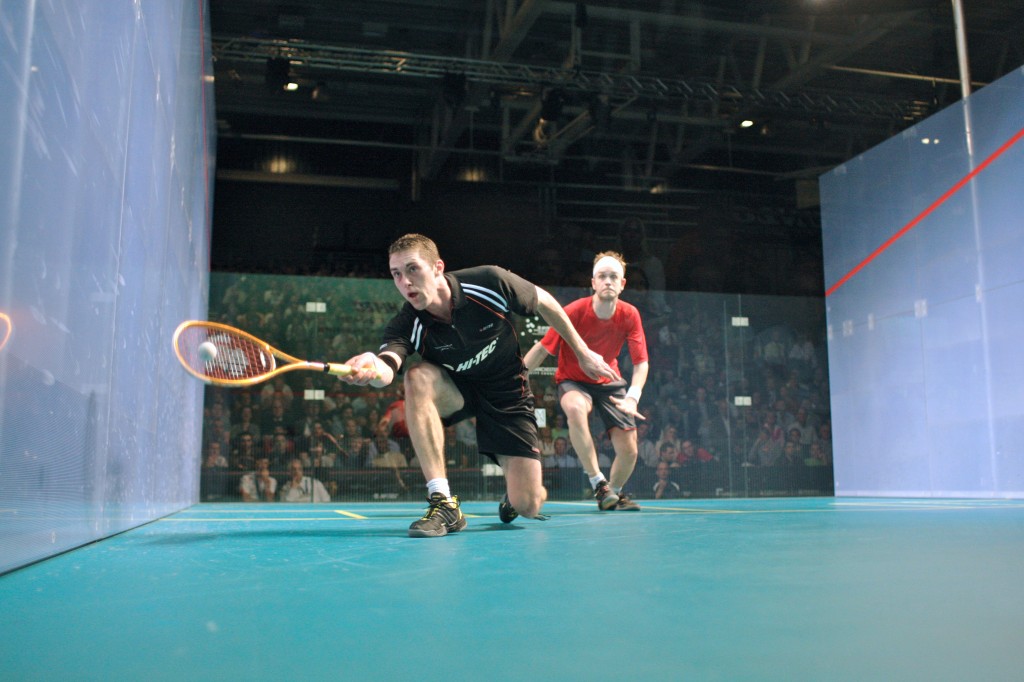
There her game had lacked the variety to deflect or disrupt the straight and hard-hitting New Zealander. Here what had improved was David’s calm, her creativity, and her assertiveness, relying less on her brilliant movement. For someone of so slight a build that is not easy.
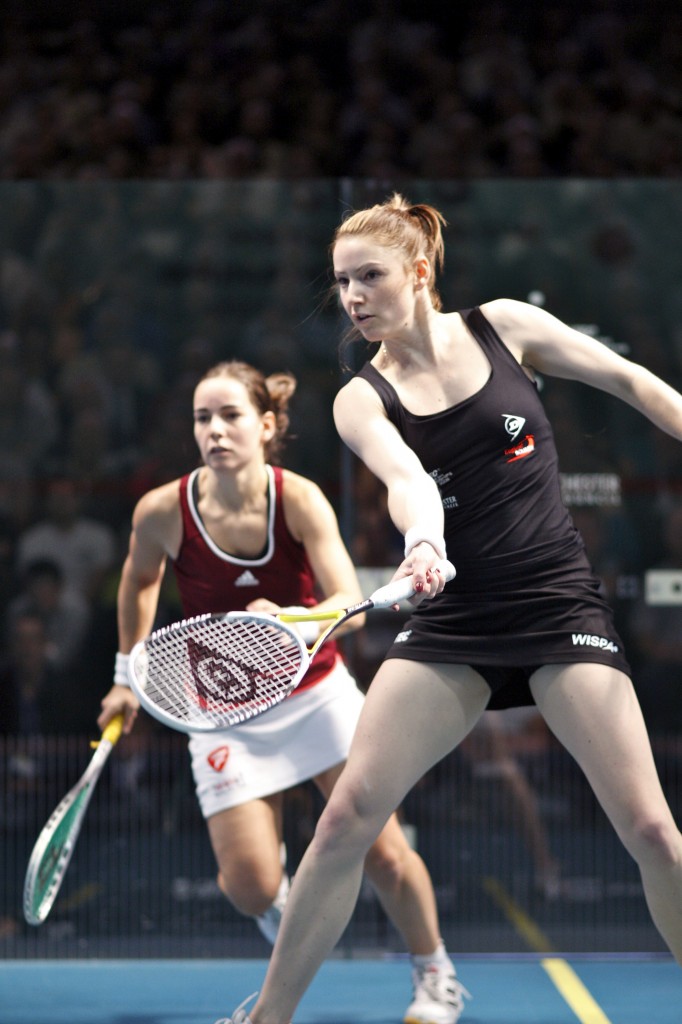
Mental improvements came from a deeper rooted professional psychology. “You don’t take all the losses out of context,” she said. “You use them for what you can do in future tournaments. I am more open to what’s going on, in whatever situation I am put into.
“This time round it’s been a matter of going in there and making it as another tournament again. Everyone’s going to be there, as in other tournaments you have been playing. I try to take the World Open how I have been playing the others. You just try to focus on what’s going on.”
Perversely, the decision to place her opening match against Sharon Wee on to one of the outside court—it seemed odd to see the most honored squash player of all time thwhacking around on a super bouncy court watched only by 50 people huddled up on a distant bleacher—may have worked in her favor.
It may have helped make it seem like any other tournament, for there she was easing her way into it on a conventional three-wall plaster court—before having to cope with the very different ambience of the glass show-court.
This stood inside a superb arena and on a multi-sports site so proud of its origins that it contains a 70-foot replica of the Big Bang, with monster metal spikes spraying in all directions like the patterns of movement of the galaxies—or perhaps of a squash player from the T.
In this context the side-lining of David made even less promotional sense. “It’s difficult to start off on the side courts (and then change), but you just have to expect these things to happen,” she said.
“It would be great to have some of the girls on the show court with the guys, so that people can see both straight away in the first round.” This was polite code for disapproval. Her coach Liz Irving was livid.
But it did make things helpfully downbeat for David, who may also have been helped to arrive fresher than last year by her better spaced out tournament schedule. It was clear too that her game is evolving, with the integration of more volley drops and more frequent bouts of early-ball volleying, and even a few reverse angles.
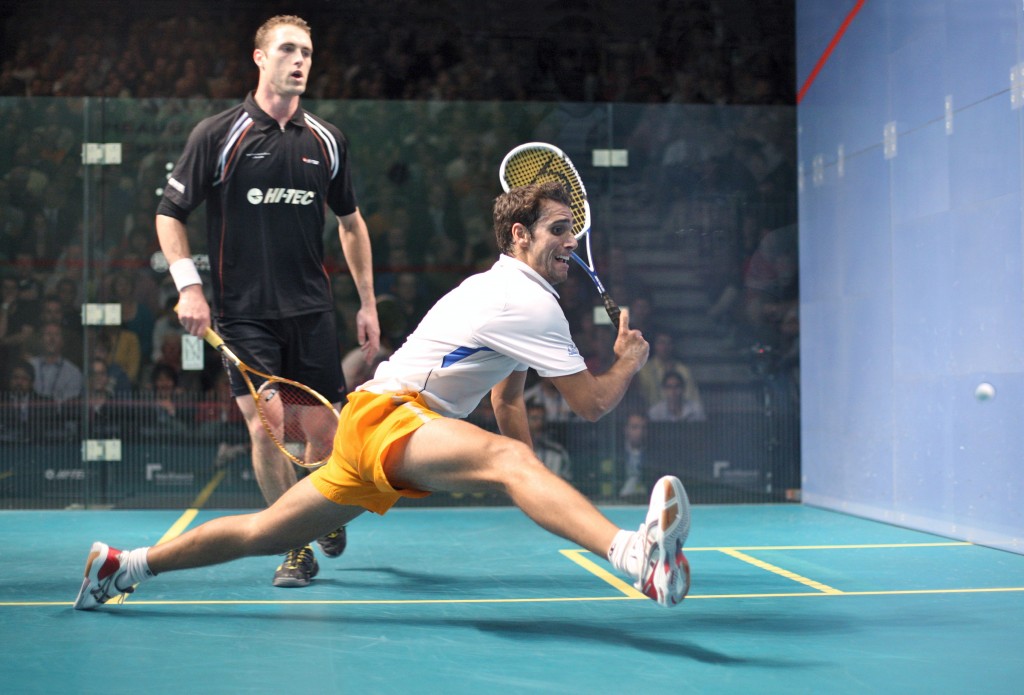
Nevertheless there were hints of crisis at 7-8 in the fourth game of the final against Botwright, when David was fortunate that her opponent hit the tin. She capitalized on the let-off with a retrieving drop shot winner and a drive-drop combination to reach match point; then converted it with a penalty stroke after the trio of British referees bravely and correctly risked the crowd’s anger by penalizing their compatriot for a mistimed shot down the center.
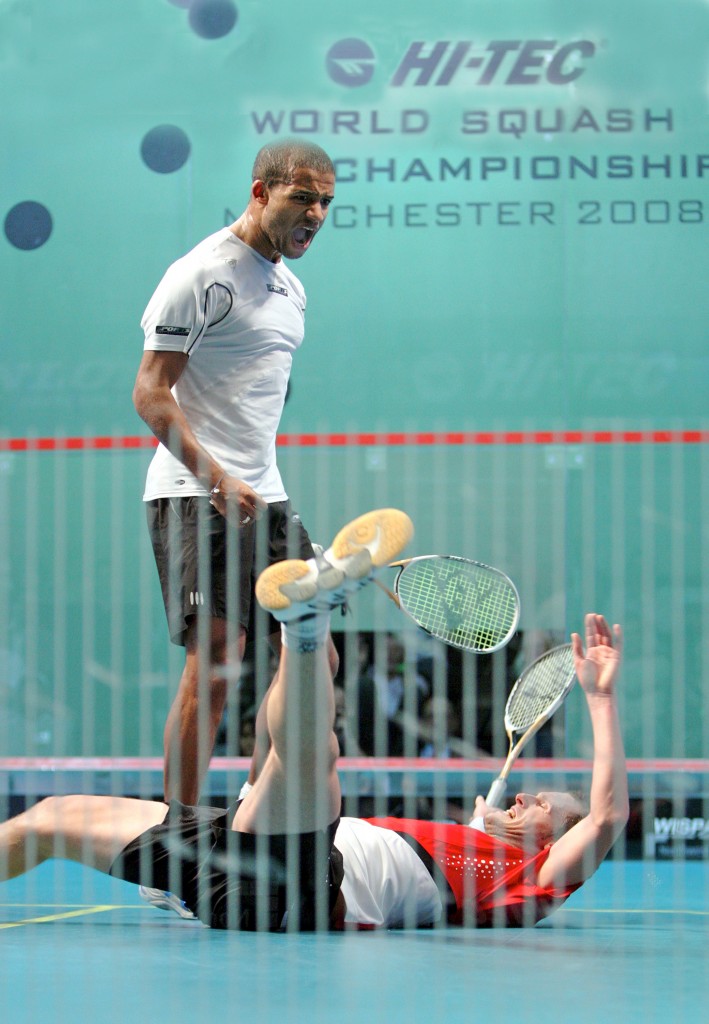
It brought an anti-climactic end. Despite this Botwright had made it a good final. By training at 7 a.m., before going to work each day, the 31-year-old had reclaimed the fitness levels which once made her a top five player. She at an even higher level with her humor.
“My dad arranged a stag do for the weekend. He didn’t didn’t reckon I’d get to the final,” she said drily. “He’s had to cancel that now.”
David had a semifinal against another Brit, the remarkable Madeline Perry, whose career was almost finished by brain damage cause by a horrific fall—or a mugging, she’s not sure which—while walking in Milan last year.
Medical opinion said that the former world number six from Northern Ireland might not be able to concentrate sufficiently to play world class squash again. Not only did she do that, but she followed a shock win over the sixth-seeded Kitchen with one of the most sensational comebacks you’ll ever see.
Perry won 6-11, 5-11, 11-9, 12-10, 11-9 against another New Zealander, Jaclyn Hawkes, the daughter of a Davis Cup tennis player and a World Masters champion squash player, who was on the verge of victory for more than half the match.
Perry, two games and 7-9 down in the third, and a giddying 5-10 down in the fourth —during which she saved five successive match points—and then 5-7 down in the fifth. Somehow she survived, something she had got used to doing in everyday life.
“It was a case of sorting out my head really after what happened to me. It was pretty traumatic, and I had to believe I would get back up again. This is probably a bigger challenge than getting up there the first time,” she said.
Perry did quite well against David in her 11-6, 11-8, 11-6 semifinal too. But the world number one was less tired than the battler from Banbridge and, with David’s main rivals falling over in other parts of the draw, there was from about day three a feeling that she would be unstoppable.
The first big faller was Natalie Grainger, the world number four from the United States, who claimed she felt “a little bit hot” during a 11-5, 5-11, 11-8, 6-11, 11-8 second round loss to the nimble Hawkes, who thus gained her second successive victory over a former world number one. She eliminated Vanessa Atkinson in round one.
Then came the crash of Rachael Grinham, the defending champion, who lost to Botwright in the second round 5-11, 11-3, 11-8, 11-8. The second-seeded Australian was sucked down by the home player’s improved ability to mix the short and the long games, and tactical nous to slow things down. This made Grinham’s famously artistic lob-drop patterns less compelling.
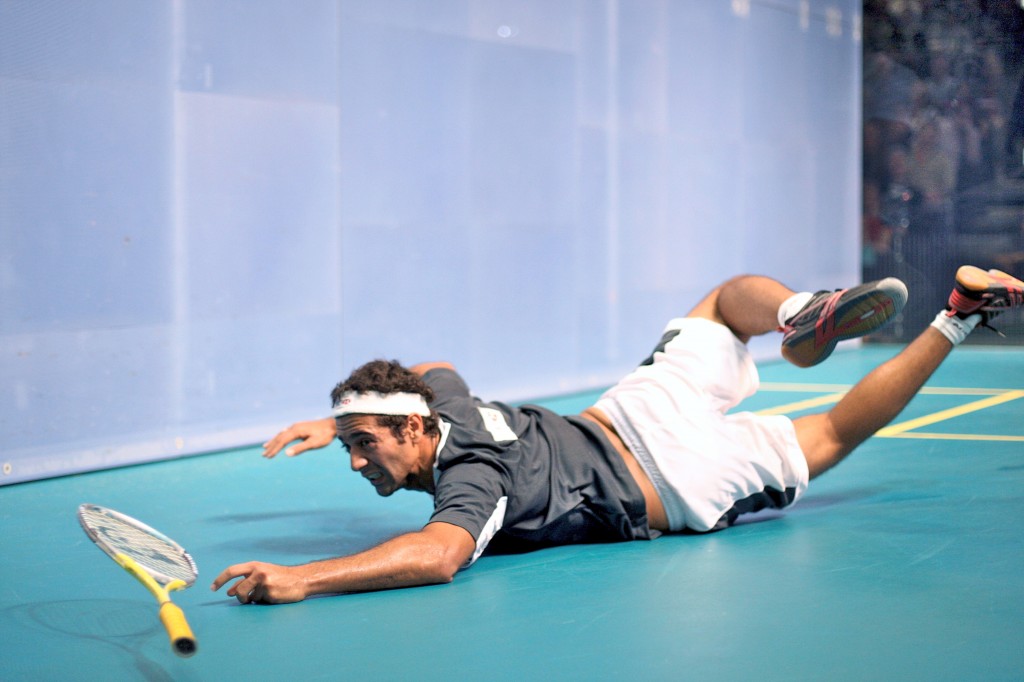
The older Grinham was also unhinged by the pressures created by a close match with an unfamiliar scoring system. From the moment it was announced that this would be first women’s World Open ever to use point-a-rally scoring, there had been argument and controversy.
David warned how difficult some of the players would find it. ”I think players are taking the opportunity to use the system by going for their shots. Everyone has to be on the ball. You just expect surprises,” she said.
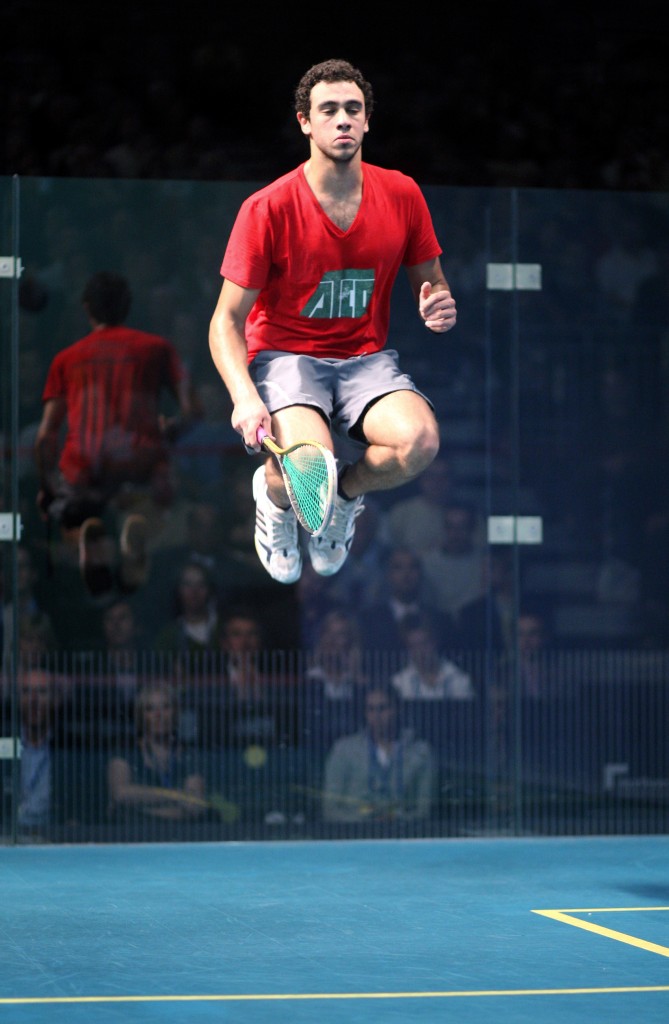
Grinham agreed. “You start the game and feel like it is half over very quickly,” she said. “You can’t play yourself into the game—it’s panic mode immediately. It’s like, oh my god, the game is almost over.”
Next day her sister Natalie was beaten too. Representing Holland for the first time in a World Open instead of her native Australia, the younger Grinham was outlasted by Jenny Duncalf, the fifth seed from England. Grinham denied the nationality change had affected her.
“I’m still playing for myself,” she insisted not altogether convincingly after a 11-8, 10-11, 5-11, 11-6, 11-7 loss in which those conspicuously nimble red-shoed feet—the smallest on the tour at size three-and-a-half, and the brightest —seemed increasingly cut off from their energy supplies. She may have been affected by a week-long illness just before the tournament.
A similar sense of unease with the scoring afflicted one of the leading male players, Greg Gaultier, the second-seeded Super Series champion from France, who lost 9-11, 12-10, 14-12, 1-11, 13-11 just when he had seemed set fair in the third round against Adrian Grant, one of his sparring partners from England.
It was one of the four important men’s upsets, with Gaultier’s French compatriot Thierry Lincou and Australia’s David Palmer, both former world number ones, both losing to lower ranked players, and with defending champion Amr Shabana failing to make the final.
“I knew if I could stay with him I would have good chance in the fifth,” the 14th-seeded Grant said after his career-best win. “Because the crowd were giving me a lift and the pressure would be on him and he would get nervous.”
That is more or less what happened, with Gaultier’s error ratio creeping up when it mattered. “I lost my head and that’s it,” he said bitterly.
This happened despite his most convincing of starts, and despite what seemed like unstoppable momentum in the fourth and fifth games when Gaultier had three match points.
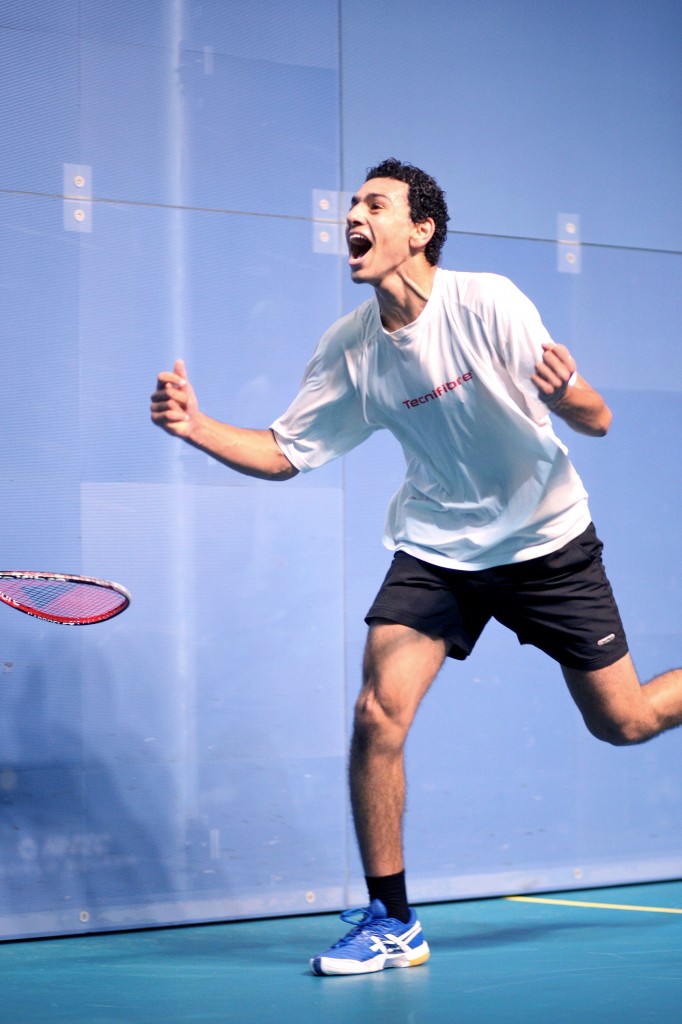
It was all the harder for Gaultier, who had been desperately unlucky with refereeing decisions on match points during the 2006 World Open final in Giza. And after losing the final last year in Bermuda too, he had set his heart on third time lucky. But he did not forget to congratulate the steady excellence of his buddy Grant, the first black player to make the world’s top 20.
No result signalled of changing times as much as the demise of Lincou. He had been the first Frenchman to become world champion in 2004 in Doha, but now failed to make the third round for the first time since 1999 after losing to Mohammed El Shorbagy, world junior champion from Egypt.
The 17-year-old had had to survive the qualifying competition and was thought too inexperienced for such a big win at this level, but he himself had no such lack of belief. His 12-10, 11-6, 7-11, 10-12, 13-11 win came after being denied one match point in the fourth game and three more in the fifth by the tour’s most renowned comeback specialist.
“I just decided to play this match without thinking about the score,” said El Shorbagy. “And that helped me—but I was certainly aware of it at the end!” He also played just the kind of game Lincou did not like, full of sudden, surprising attacks
The loss of that other 30-something, Palmer, occurred partly because of the difficulty in getting up to the same high level on successive nights. He had played two of the best games of his career in the fourth and fifth to beat the third-seeded James Willstrop in five, but lacked the same zest while losing 11-6, 11-9, 11-8 to Karim Darwish in the semifinals.
Some of it though was down to the tactical astuteness of Darwish—possibly with the coaching assistance of Engy Kheirallah, his wife, who has a talent for that, and the subtle lowering of the ball to heights from which it was difficult for Palmer to volley.
He was fuelled by the memory of the ill-timed injury five months earlier in Liverpool, just when he had been on the verge of beating Palmer at the British Open, where the Aussie took the title.
Darwish’s and El Shorbagy’s successes were two of the signs that many, perhaps up to eight, Egyptians could soon be in the top 20. Is that a problem for the sport? Not necessarily, if we get many matches like that in which Amr Shabana lost his title.
If losing is at some stage inevitable, Shabana may have felt that this was an acceptable way and against the most acceptable opponent. Hundreds of quicksilver patterns were etched and chiselled all over the court during the 11-7, 7-11, 7-11, 11-9, 11-7 defeat to Ramy Ashour, the 21-year-old compatriot who last year came within a fraction of a ranking point of toppling him from number one.
Shabana was not far from victory as he edged up to 7-4, 8-6, and then 9-8 in the fourth game, but at that moment was denied by the most amazing shot of the tournament. As Ashour dashed diagonally back from the front right, the ball hurtled diagonally across from the front left, and the two met like forked bolt in the middle, with a winning volley emerging amidst the thunder and lightning almost like the hand of god.
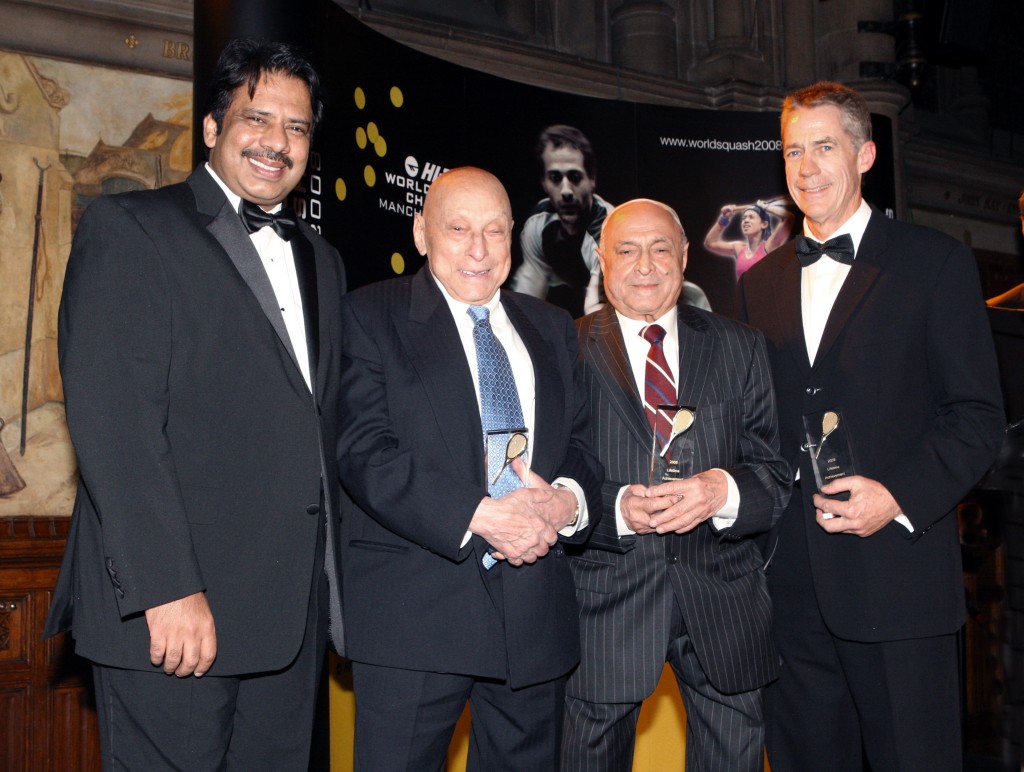
Shabana had confided before their classic encounter that he had been happy to help his compatriot with tips which might advance his development. “It’s like playing a brother,” Ashour said.
The final was good too, but not as good as that. Darwish, the Alexandrian, made a fine start, flicking the ball about and masking his intentions often enough to frustrate the young brilliant from Cairo. But once Ashour survived a second game mini-crisis, it was more a question of whether he had the strength of mind to take the great prize his skills and athleticism were offering him.
“I tried not to think about this tournament but the tournament I would be playing next week,” he admitted after his 5-11, 11-8, 11-4m 11-5 triumph—without the hint of humor, even though it made his questioners roar with laughter.
The abiding memory is of Ashour and Shabana posing for photos with the Premiership Cup, the world’s most lucrative soccer trophy, and which resides just a mile or two away from the SportCity site which contains the squash complex.
It had been smuggled across the city from arguably the most famous club in the world, Manchester United, to one which has certainly and suddenly becoming the richest, Manchester City, bought by Mansour bin Zayed Al Nahyan, the billionaire sheikh from Abu Dhabi, for many hundreds of millions of pounds.
Not only is this a symbolic shift in the economics of soccer, but it hinted at where the riches in squash have moved—to the Middle East—and are likely to remain for the forseeable future.


